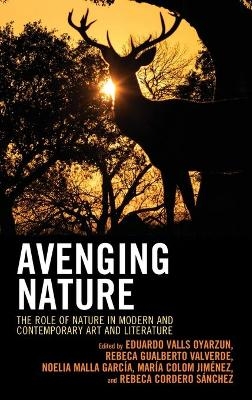
Avenging Nature
Lexington Books (Verlag)
978-1-7936-2144-3 (ISBN)
“Nature, thou art my goddess”—Edmund’s bold assertion in King Lear could easily inspire and, at the same time, function as a lamentation of the inadequate respect of nature in culture. In this volume, international experts provide multidisciplinary exploration of the insubordinate representations of nature in modern and contemporary literature and art. The work foregrounds the need to reassess how nature is already, and has been for a while, striking back against human domination. From the perspective of literary studies, art, history, media studies, ethics and philosophy, and ethnology and anthropology, Avenging Nature highlights the need of assessing insurgent discourses that—converging with counter-discourses of race, gender or class—realize the empowerment of nature from its subaltern position. Acknowledging the argument that cultural representations of nature establish a relationship of domination and exploitation of human discourse over nonhuman reality and that, in consequence, our regard for nature as humanist critics is instrumental and anthropocentric, the present volume advocates for the view that the time has come to finally perceive nature’s vengeance and to critically probe into nature’s ongoing revenge against the exploitation of culture.
Eduardo Valls Oyarzun lectures at the Department of English and American Literature, Complutense University of Madrid. Rebeca Gualberto Valverde works as assistant professor at the Complutense University of Madrid. Noelia Malla García works as an assistant professor of English at the Department of English Philology at the University of Extremadura. María Colom Jiménez works as an assistant professor at Complutense University of Madrid. Before becoming a language teacher, Rebeca Cordero Sánchez worked as a research assistant in the English Department at the Complutense University of Madrid.
Introduction, Eduardo Valls Oyarzun
Part I
Towards a New Ecocritical Ethics: Cultural Perspectives
Chapter 1. Bringing Culture Back to Nature: A Biosemiotic Reading of Annie Dillard’s Pilgrim at Tinker Creek, Anastasia Cardone
Chapter 2. “Have You Seen the Snow Leopard?”: Animal Commodity Resistance in Peter Matthiessen’s The Snow Leo, Frank Izaguirre
Chapter 3. “With One Arm I Supported Her: The Other Arm Was the Executioner’s”: An Ecofeminist Reading of Anna Kavan’s Ice, Laura de la Parra
Chapter 4. “We Were Neither What We Had Been Nor What We Would Become”: Frankensteinian Science and Liminal States in Jeff VanderMeer’sAnnihilation, Jessica Roberts
Chapter 5. Santiago Rusiñol’s Abandoned Gardens: Between the Poetics of Ruin and the Defense of a Lost Identity, Laura Sanz García
Part II
Empowering Nature: Transcending Anthropocentrism in the Anthropocene
Chapter 6. Welcoming Cosmos: A Comparative Study of Narrative, Nature and Cosmopolitanism in The Wall and Pond, Hande Gurses
Chapter 7. A Few Sockeyes and Dying Embers in What Is Left of the Forest: Settler Culture and Changing Views of Nature in Gail Anderson Dargatz’s Latest Novels, Pedro Miguel Carmona
Chapter 8. The Last Epigram: Christian Bök’sXenotext, Ryan Winet
Chapter 9. A Poetic Correspondence on Ecology and the Green World: Allan Cooper and Harry Thurston’sThe Deer Yard, Leonor Martínez
Chapter 10. Wonders and Threats of Symbiotic Relationships in the Anthropocene: Jeff VanderMeer’s The Southern ReachTrilogy, Patrycja Austin
Part III
The Age of Dystopia: Nature against Culture in Contemporary Literature and Film
Chapter 11. Demonizing Nature: Ecocriticism and Popular Fantasy, Peter Melville
Chapter 12. Accepting the X: Uncanny Encounters with Nature and the Wilderness in Jeff Vandermeer’sThe Southern Reach Trilogy, Carmen Méndez
Chapter 13. Ecocritical Archaeologies of Global Ecocide in 21st–Century Post–Apocalyptic Films, Mónica Martí
Chapter 14. Biohazard, Eco–terror and the Rise of Post–Human Dystopia: Re (b) ordering Space to Promote Environmental Ethics in ZalBatmanglij’sThe East and Cormac McCarthy’s The Road, Paula Barba Guerrero
Chapter 15. Another Inconvenient Truth: Hollywood, the Myth of GreenCapitalism, Víctor Junco
Chapter 16. De–Evolution, Dystopia and Apocalypse in American Postmodern Speculative Fiction, Javier Martín Párraga
Index
About the Editors
About the Contributors
| Erscheinungsdatum | 10.05.2021 |
|---|---|
| Reihe/Serie | Ecocritical Theory and Practice |
| Verlagsort | Lanham, MD |
| Sprache | englisch |
| Maße | 161 x 228 mm |
| Gewicht | 581 g |
| Themenwelt | Kunst / Musik / Theater ► Kunstgeschichte / Kunststile |
| Naturwissenschaften ► Biologie ► Ökologie / Naturschutz | |
| ISBN-10 | 1-7936-2144-6 / 1793621446 |
| ISBN-13 | 978-1-7936-2144-3 / 9781793621443 |
| Zustand | Neuware |
| Haben Sie eine Frage zum Produkt? |
aus dem Bereich


